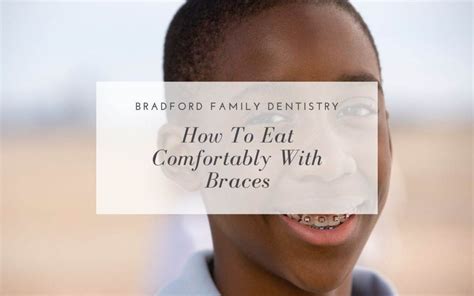How To Eat Comfortably With Braces? Painfree Tips

Eating with braces can be a challenging and uncomfortable experience, especially during the initial adjustment period. The metallic brackets and wires can cause irritation to the cheeks, lips, and tongue, making it difficult to chew and swallow food. However, with some planning, patience, and practice, you can learn to eat comfortably with braces and minimize the discomfort.
Understanding the Challenges
Before we dive into the tips, it’s essential to understand the challenges associated with eating with braces. The primary concerns include:
- Food getting stuck: Small food particles can get stuck in the brackets and wires, causing discomfort and potentially leading to tooth decay or gum disease.
- Irritation and pain: The brackets and wires can irritate the cheeks, lips, and tongue, especially during the initial adjustment period.
- Difficulty chewing: The braces can make it challenging to chew food properly, leading to swallowing difficulties or avoiding certain foods altogether.
Soft Foods: The Key to Comfortable Eating
During the initial adjustment period, it’s recommended to stick to a soft food diet to minimize discomfort and allow your mouth to adjust to the new braces. Some excellent soft food options include:
- Yogurt: High in calcium and protein, yogurt is an excellent choice for people with braces. Look for soft, creamy varieties to reduce irritation.
- Mashed potatoes: A classic comfort food, mashed potatoes are easy to eat and can be flavored with herbs and spices for added taste.
- Scrambled eggs: Scrambled eggs are a great source of protein and can be cooked to a soft, fluffy texture that’s gentle on the mouth.
- Soups: Soups are an excellent option for people with braces, as they’re easy to eat and can be made with a variety of ingredients. Look for soft, blended soups to reduce irritation.
Pain-Free Tips for Eating with Braces
In addition to sticking to a soft food diet, here are some pain-free tips for eating with braces:
- Cut food into small pieces: Cutting food into small, manageable pieces can help reduce irritation and make eating more comfortable.
- Chew slowly and carefully: Take your time when eating, and chew your food slowly and carefully to avoid irritating your mouth.
- Avoid sticky or hard foods: Sticky or hard foods, such as candy or nuts, can get stuck in your braces and cause discomfort. Avoid these foods altogether, especially during the initial adjustment period.
- Use a braces-friendly utensil: Consider using a braces-friendly utensil, such as a spoon or a fork with a soft grip, to reduce irritation and make eating more comfortable.
- Take breaks: If you’re experiencing discomfort or pain while eating, take a break and come back to your meal when you’re feeling more comfortable.
Managing Discomfort and Pain
While eating with braces can be uncomfortable, there are several ways to manage discomfort and pain. Here are some tips:
- Use orthodontic wax: Orthodontic wax can be applied to the brackets and wires to reduce irritation and discomfort.
- Take over-the-counter pain relievers: Over-the-counter pain relievers, such as acetaminophen or ibuprofen, can help reduce pain and discomfort.
- Rinse with salt water: Rinsing your mouth with salt water can help reduce inflammation and soothe irritation.
Conclusion
Eating with braces requires some planning, patience, and practice, but with the right tips and strategies, you can learn to eat comfortably and minimize discomfort. Remember to stick to a soft food diet during the initial adjustment period, cut food into small pieces, and chew slowly and carefully. By following these pain-free tips, you can enjoy your favorite foods while taking care of your braces and ensuring a healthy, beautiful smile.
What are some good soft food options for people with braces?
+Some excellent soft food options for people with braces include yogurt, mashed potatoes, scrambled eggs, and soups. Look for soft, creamy varieties to reduce irritation.
How can I manage discomfort and pain while eating with braces?
+Use orthodontic wax to reduce irritation, take over-the-counter pain relievers, and rinse your mouth with salt water to reduce inflammation and soothe irritation.
What are some foods that I should avoid while wearing braces?
+Avoid sticky or hard foods, such as candy or nuts, as they can get stuck in your braces and cause discomfort. Also, avoid chewing gum, as it can stick to your braces and cause damage.
By following these tips and strategies, you can enjoy a comfortable and pain-free eating experience with your braces. Remember to always consult your orthodontist if you have any concerns or questions about eating with braces.
